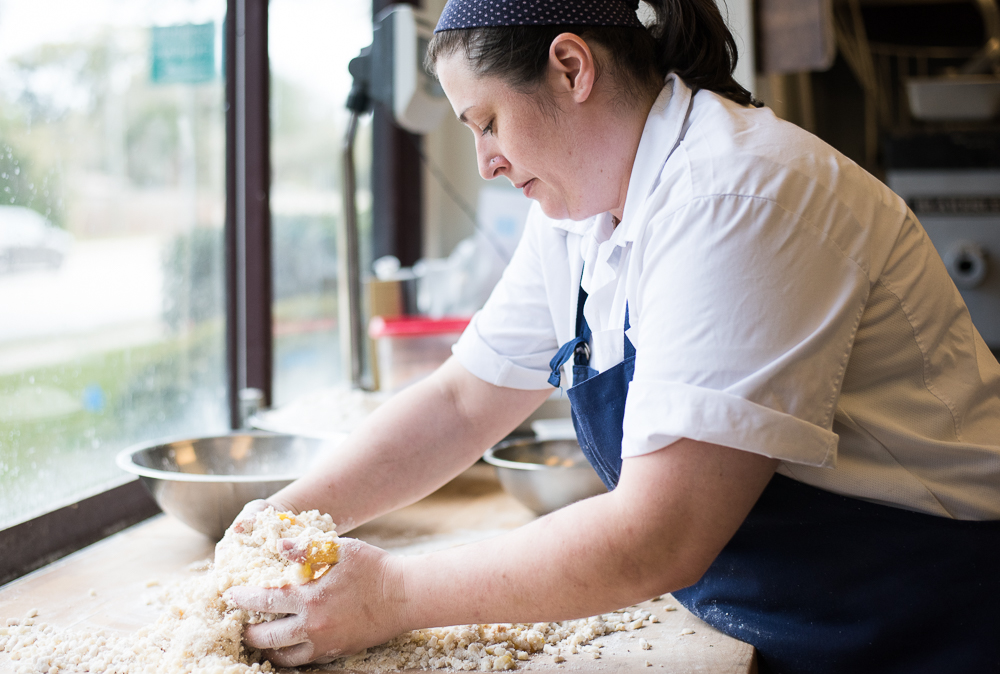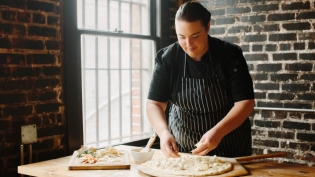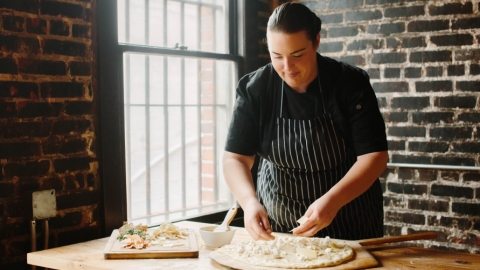Natanja de Beer and Telling Stories through Food
Passionate about telling the story of our lives through food, Natanja De Beer is committed to supporting a sustainable food system that provides long-term benefits to our environment, our economy and our well-being. Early on, she learned the importance of the relationship between farmers and kitchens. For her, sourcing locally is not only important to the culinary identity of regional restaurants everywhere, it's a trademark of the dishes she prepares at Blackfly in St. Augustine.
You have worked in several leading restaurants in the area. How many years have you been in the business of food and how did you get started?
Yikes! I would say almost 13 years now. I started as a server originally, and then transitioned into Prep, and worked myself to the line. I have worked at Hank's Seafood, McCrady's and Husk in Charleston, Marker 32 in Jax Beach, Moxie Kitchen + Cocktails and Terra & Acqua in St.Augustine.
Do you recall one of the first things you made before starting down the path of a professional chef? Is there something, in particular, that draws you to food? If so, what is it and how has it captured your attention?
When we lived in Australia, my mother and father would host elaborate dinner parties for visiting Captains. My mom would take several days cooking up a feast, but she was terrible at making desserts, so it was my duty to make them.
What particularly draws me to food is the philosophy of it. It holds religious value, it’s historical, cultural, geographical, political, socio-economical, scientific, etc. It’s been said that life imitates art; that outside forces are what makes us creative. I believe that food is the creation of art imitating life. It’s who we are, where we come from, and tells the story of how we have lived.
What are some of your future culinary goals? What achievements are you most proud of?
My 5 year goal is to open up something small; maybe no more than 60 seats, have two seatings a night, and just kill it. Nothing extra fancy, but honest food that can be enjoyed by everyone.
I can’t tell you what achievements I’m most proud of, because in this industry an achievement can be nailing a flawless service, to making a guest's dining experience exceptional, creating a dish, to landing the job of your dreams. I’ve dedicated a lot of hard work to this industry, many hours with my head down, and it’s an industry where you don’t do something just to gain the recognition of achieving something. My proudest moment will be when I start creating my own menu.
Who have been some of your role models and mentors, and why?
I moved up to Charleston in 2008. I literally walked off the streets into Hank’s Seafood, asking for a line cook position with very little experience, and Chef Frank McMahon hired me at a fair wage and the Hank boys gave me my chops. I know that I can go to him to this day and ask him for his advice.
Two people who really, really, really gave me my chance are Chef Sean Brock and Chef Travis Grimes at Husk in Charleston. Chef Brock created so many opportunities for so many people, and I am thankful for the 5 years I was able to work in his kitchens. Chef Grimes holds a dear place in my heart. I was a pain-in-the-ass line cook when he was starting out as Chef de Cuisine, but he knew I was a dedicated worker, and that I was in it for life. He really allowed me to make many mistakes and grow and was supportive of me, even during his most pivotal career moment. That’s character. And he will never know how much it has meant to me.
A recent role model for me is the grill cook at Moxie, and her name is Rachel.
From your experience, what's the biggest challenge to being a woman in the food business? What are some of your character traits that have enabled you to advance in the professional kitchen?
I knew this was going to be a question. To be honest, and I say this because it’s important for future ladies in this industry, being a women in this industry means that you have to be a beast. You have to work 20 times harder to break the mold. You’re going to cry. A lot. Not because you’re weak, but because you have to endure the raw ego.
On a political side, there is a wage gap that is very apparent in this industry, one that many female chefs have discussed. Luckily, I personally haven’t experienced that, but I have witnessed it. Other challenges are the “mom” question.
Character traits that have helped me throughout my career is that I’m a relentless cook, a hard worker that will do whatever it takes to have a successful service. That’s my back bone. And honesty, the willingness to sacrifice pretty much everything, never giving up, and knowing when to walk away. There’s a lot of treachery and unfairness that occurs in this industry, and it used to make me very emotional, but now I don’t put up with BS. Like I say to my girls…. “chin up, and give ‘em hell, baby girl."
We talk a lot about seasonal ingredients and consumers, chefs, restaurants, artisans and farms working together as a "food system." What are some of the hurdles to restaurants "buying local" on a consistent basis? What could be done to help bridge this gap?
This is a topic very close to me. While in Charleston, I learned the importance of the relationship between farmers and kitchens. Sourcing locally is imperative to the culinary identity of regional restaurants anywhere. Not only does it encourage a local economy, it really forms a responsibility to what we are doing as Culinarians. Geopolitics, industrial farming and globalization have been a game changer. You can get whatever you want, regardless of the season. I feel this creates a false market price for the consumer and the cost of goods keep going up, but it doesn’t mean that the quality is there.
I used to think locally was the way to go, but that “responsibility” twinge kicks in, and understanding that there is a global market that won’t go away, I’ve converted to a sustainability frame of mind. I think it’s important for the future of food, so that those products are still around so we can keep telling that story of who we are, how we lived, and where we came from. Humans aren’t on top of the food chain anymore; it’s big companies that mean big business, and it’s scary what they are doing to our “food.”
As far as “buying local” on a restaurant business level means a lot of money being spent, and guests probably thinking your prices are too high. The biggest hurdle buying local is probably availability. You’re at the mercy of the farmers, so if you can’t get it from them, and you need it, where are you going to source it from? Another hurdle is that the little guys are being eaten up by the larger guys, and now you form a relationship with a representative versus a purveyor.
What can be done to bridge this gap? Education, sharing knowledge, forming community groups. holding workshops. I know what I have learned and I put that philosophy into practice. It’s important to me to form relationships with my purveyors, because they get into some really weird stuff. I love The Garden, particularly because they have Allen Suggs growing gorgeous hydro products. I love Lynn from Veggie Confetti because her microgreens are cared for and it’s important to her that they are perfect. There’s a farmer, Joey Versaggi, who is growing some really amazing products straight from the ground. That’s what is important to me, and I feel it should be important to all of us. It’s honest.
Finally -- what ingredient do you most enjoy cooking with, and why?
Hands down, lavender. There are so many tones to it so you can really play with building flavors or just leave it as is. It complements a wide variety of proteins and produce, you can use it in desserts, it’s a pretty color, smells great and has medicinal purposes.







